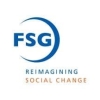What does 2025 mean for the future of social impact? The 2024 global election cycle revealed a striking international sentiment: most voters don’t want things to stay the same. With most incumbent parties voted out in 60+ elections, many researchers attribute this anti-incumbent wave to rising costs and economic inequality that have been compounded since the start of the COVID-19 pandemic.
This turbulence manifested through significant shifts in social impact landscapes. Growing DEI and ESG backlash spurred fears within the private and philanthropic sectors, causing many companies to reexamine their DEI efforts, while U.S. funders closely monitored the implications of the Fearless Fund case for race-conscious grantmaking. Simultaneously, climate change’s escalating toll was clear, with disasters like Hurricanes Helene and Milton in the U.S., Typhoon Yagi in Southeast Asia, and record-breaking heat waves across continents.
These trends reflect a broader sense of dissatisfaction with systems failing to meet the needs of communities. As we enter 2025, we asked leaders across FSG to share how social impact leaders can rise to the challenges of the upcoming year.
1. Doubling down on place-based work
With change and unpredictability at the federal level in the U.S., it will be more important than ever to invest in and pursue place-based work. Many philanthropic leaders are recognizing the critical importance of place-based strategies that can drive meaningful change from the ground up.
“In today’s landscape, arguably every issue is urgent,” said John Harper, CEO of FSG. To withstand these challenges, he shares the need for prioritizing inclusive civic infrastructure that unites cross-sector stakeholders at the local level. He says, “Regardless of which issue you might target, consider how your approach helps build the collaborative infrastructure necessary for lasting community change.” Similarly, Jennifer Splansky Juster, Executive Director of the Collective Impact Forum, shares, “Place-based collaboratives, which bring together a broad variety of cross-sector actors, create a civic infrastructure that is adaptable and resilient against challenges that arise from election cycles or unforeseen events. Doubling down on these local relationships can enable communities to advance change amidst uncertainty.”
As more funders look to double down in place, funders should consider how they can be more intentional and impactful in their place-based philanthropy. “As place-based funders increase their attention on supporting change at the state and local levels, they will need to sharpen their geographic focus,” said Ryan De Souza, Director at FSG. For example, the U.S. South receives less than three percent of philanthropic funding, “an investment that is disproportionate not only to the size of the population but also to the potential for greater equity that is waiting to be unlocked,” he adds.
It is also critical for funders to invest in the practitioners who are supporting this work. “As place-based collaboratives continue to wrestle with ways to achieve equitable outcomes in their community in increasingly challenging environments, it is even more imperative that philanthropy invest in opportunities for practitioners to learn and grow together in this work through communities of practice,” said Courtney W. Robertson, Director of Programs and Partnerships at the Collective Impact Forum. “Investing in cross-collaborative learning spaces can enable place-based practitioners to implement more effective and innovative solutions to the complex social issues they are working to address.”
2. Developing new playbooks for corporate social impact
As companies face DEI and ESG backlash, leaders may have less leverage with moral arguments for social impact, such as “it’s the right thing to do.” One way to advance social impact against such headwinds may be leaning into proven strategies that integrate a business benefit, such as shared value. “As the strong advocacy of moral arguments for social impact is being tested, companies can deploy shared value strategies which allow organizations to create meaningful social change and business value at the same time,” said Bobbi Silten, Chief of People & Culture and Managing Director at FSG.
Corporate changemakers will also need to develop a more sophisticated toolkit for advancing change in 2025. This includes deepening their own capacity to influence internal dynamics and effectively embedding social impact across the business and into daily operations. “Expertise on the nonprofit sector or social issues is no longer enough for corporate changemakers,” said Lakshmi Iyer, Managing Director at FSG. “In 2025, leadership and operational skills will be as necessary as expertise in social impact.” As Chirlie Felix, Managing Director at FSG, notes, “Success isn’t just about the ‘why’ anymore—it’s about mastering the ‘how’ and bringing others along the journey. This demands a unique skill set: strong communication, deep listening, and a nuanced understanding of individual and organizational motivations.”
Community also plays a crucial role in being able to find a way forward in 2025. “A learning and practice community serves as a vital support system, helping businesses and changemakers realize they are not alone in navigating these complexities,” said Scotland Nash, Director of Employer Transformation at Talent Rewire. “In this context, being a part of a community with various stakeholders—such as peers, industry experts, policymakers, and social activists—becomes increasingly important. It fosters a sense of solidarity and allows leaders to adapt and thrive in the face of complexity.”
3. Reimagining the role of philanthropy
Philanthropy is undergoing a significant transformation, moving from top-down approaches to embracing an ecosystem approach that emphasizes working in close partnership with the broader ecosystem of stakeholders. This evolution has been fueled by practices such as funder collaboratives, trust-based philanthropy, participatory grantmaking, and responsive funding strategies that encourage collaboration and shifting power to communities.
As a new U.S. presidential administration takes office, funders have the opportunity to listen carefully to their grantees and across the broader ecosystem to strengthen support for communities and organizations. “The results of this year’s election are inspiring important conversations about philanthropy’s role in community and society,” said Chris Carlson, Managing Director at FSG. “Going into 2025, we expect funders to reflect and act on critical topics such as adapting strategies in a changing policy environment, strengthening support for frontline communities and organizations, and promoting connection and collaboration across difference.”
With uncertainty at the federal level, funders will need to continually monitor changes in federal policies and programs that will impact communities. As these changes unfold, funders may need to move resources flexibly and quickly. This may look like resourcing grassroots organizations, supporting independent media and widespread access to timely and accurate information, and building strong networks for ongoing capacity building and mutual support, including legal aid. In an increasingly polarized social landscape, philanthropy can also play a crucial role in bridging divides and creating spaces for meaningful dialogue and collaborative problem-solving.
“In the coming months, funders can listen deeply to grantees and community partners about what is most needed and when.” said Fay Hanleybrown, Managing Director and Head of FSG’s U.S. Consulting practice. “Systems change funders recognize that those closest to the problem have the deepest knowledge of solutions. Given the current unpredictable and shifting context, their role is to amplify these voices and support community-driven solutions.”
4. Finding ways to address growing economic anxieties
The 2024 global elections exposed profound economic anxieties among workers worldwide. According to CBS News exit polls, 75% of voters in the United States reported inflation-related hardships, with 45% feeling economically worse off than four years prior. Globally, economic discontent is driving change; since inflation peaked in 2022, 70% of incumbent parties in advanced economies have lost reelection. These trends underscore a growing urgency to address the struggles of frontline employees.
“Keeping up with basic expenses such as food, housing, and childcare is becoming increasingly out of reach for so many people,” said Erin Sullivan, Director at FSG. “Social impact leaders will need to balance focusing on longer-term systemic change while acknowledging people are in crisis now and need immediate support.”
This economic strain underscores the importance of centering frontline employee voices to design meaningful solutions. Furthermore, the rapid adoption of artificial intelligence is reshaping industries, heightening worker anxieties about job displacement and economic stability. “Many Americans feel like they’re being left behind economically, which means that we need to better center frontline employee voices and engage them in solution generation,” said Kimberly Shin, former Managing Director of Talent Rewire.
The broader task ahead involves not only improving economic conditions, but also rebuilding trust with those who feel disenfranchised. “A clear theme emerging from the 60+ global elections is the urgent need to rebuild trust in governing systems, companies, and institutions,” noted Noa Gafni, Managing Director at FSG. “We need meaningful, systemic change that drives progress for all, and we will need to work together by building trust through connection, belonging, and meaning.”
Despite these challenges, research consistently underscores the benefits of inclusive workplaces. For example, a 2023 McKinsey study found that organizations in the top quartile for gender diversity were 25% more likely to achieve above-average profitability. “In 2025, we hope that the business case for a gender-diverse workforce will become pervasive, with companies measuring and sharing data on gains in efficiency, productivity, employee engagement, and bottom-line performance,” said Vikram Jain, Managing Director of FSG Asia. “Leaders who invest in fostering inclusive workplaces will not only drive equity, but also unlock a competitive advantage.”
5. A place-based approach to health
Collaborative, place-based approaches to addressing health disparities continue to gain momentum globally, driven by different regulatory changes across regions and a push for localization in improving health systems. These efforts bring together cross-sector actors to address social determinants of health, such as access to nutritious food, stable housing, and economic opportunity.
For example, funders are increasingly experimenting with place-based approaches for improving community mental health and well-being. In the United States, nearly half of Americans live in areas with a shortage of mental healthcare providers, highlighting the need for solutions that go beyond expanding treatment options. “More foundations are experimenting with place-based approaches for addressing mental health and substance use,” said Abigail Ridgway, Managing Director at FSG. “In 2025, we expect to see more growth in these place-based behavioral health collaboratives and opportunities for learning across these communities.”
Another critical consideration in the U.S. is the likelihood of federal cuts to Medicaid, which could leave over 3 million people without healthcare coverage. A big question for funders and companies will be whether to fill gaps in access to services, or whether to double down on their focus on prevention and upstream solutions.
Globally, health misinformation remains a growing threat, undermining public trust in health systems worldwide. From vaccine skepticism to false claims about the harms of fluoride in drinking water, misinformation hinders efforts to advance health equity. Healthcare companies, funders, and cross-sector coalitions are increasingly recognizing the importance of rebuilding trust in health systems through efforts such as supporting community-based education, improving public access to trusted sources of information, and reshaping narratives to avoid perpetuating marginalization and stigma.
Amid these uncertainties, partnerships and cross-sector coalition-building remain essential. “The relational nature of health equity work will continue to deepen and evolve,” said Lolita Castrique-Meier, Director at FSG. “Success requires cultivating authentic relationships that transcend traditional organizational boundaries across functions and geographies. By centering and partnering with diverse voices, health equity leaders can build trust, create powerful coalitions, and champion collective action to transform systems of care globally.”
6. Focusing on the intersections between climate and communities
Climate change continues to disproportionately affect marginalized communities, impacting economic, physical, and mental well-being. Foundations and companies who do not traditionally view themselves as climate-focused must consider its ripple effects on their work, or risk falling short of their goals. Addressing these challenges requires leaders across sectors to collaborate at the intersections of climate, health, and economic mobility.
“Corporate and foundation leaders must look at climate action through the lens of equity,” says Vignesh Shankar, Managing Director of FSG Asia. “As we advance green solutions, it’s vital to prioritize social investments that uplift marginalized communities disproportionately affected by climate change. Efforts that provide sustainable livelihoods, invest in climate-resilient infrastructure, and ensure a just transition are essential.”
Addressing climate change’s disproportionate impact on marginalized communities calls for new partnerships. “In recent years, we’ve learned more about the costs of climate change on human health—including care delivery expenses, climate-related illnesses, and lost productivity,” says Clare Schroder, Director at FSG. “These costs disproportionately impact those already experiencing health inequities. Moving forward, collaboration between health and climate leaders will be critical to develop integrated solutions and long-term strategies.”
The clean energy sector is emerging as a critical nexus for addressing the impacts of climate change on communities and advancing economic mobility. “Foundations and companies in the clean energy sector are working to bridge the gap between community needs and industry requirements,” said George Zaninovich, former Director of Employer Transformation at Talent Rewire. said “Developing better career pathways for frontline and entry-level green jobs is a win-win for advancing economic mobility for individuals, families, and, as a result, the communities in which they live, work, and shop.”
In this age of recurring climate disasters, philanthropy and corporations also need to rethink their approach to disaster response. “Companies must develop a more ongoing, strategic approach to disaster preparedness and mitigation,” says Nikhil Bumb, Managing Director at FSG. “This means deploying a broader range of assets and deeply understanding the intersections of climate with other social impact areas like health, economic mobility, and sustainability.”




















